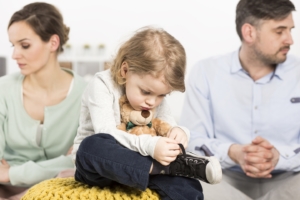Co-parenting can be a challenge during normal times, but the recent Coronavirus pandemic has made it even tougher to navigate. Traveling back and forth between homes may have caused frustration related to school, work, or extra-curricular activity schedules during pre-pandemic times, but depending on each family’s unique situation, it may currently be a health risk.
Most families have been required to shelter at home during the past few weeks. But what does that look like if you’re a child who goes between two homes? Each parenting plan and schedule is unique – one parent may be the primary custodial parent, or parents may share physical custody 50/50. Whether your children go back and forth every few days or every other week, there are important factors to consider when deciding if you need to alter your parenting plan during the pandemic:
- Are either (or both) parents “essential workers,” and at a higher risk of being exposed to the virus?
- Is one parent more easily able to work from home and care for the children?
- Do both parents have equal access to Wi-Fi if children need to be online for school?
- Do the children, either parent, or family members living with them have a chronic illness or condition that puts them at a higher risk of complications if they contract the virus?
- Does one parent have more green space for kids to play while parks and recreation areas are still closed?
Because of these reasons (and other unique, family-specific situations), you may need to consider a temporary change in your parenting schedule:
- If you’re on good terms and agreeable, you could all shelter in place all together. This doesn’t work for every family, but it could help cut down on exposure and make things logistically easier on everyone during this unprecedented time.
- Consider having the children stay with one parent for the duration of the pandemic. Have frequent video chats, texts, play online games with each other, and promise to let the other parent spend extra time with the children once things are safer. Make sure to get agreed upon changes in writing.
- If you must go back and forth, extend the time period from two to three days to a week at a time. Ensure that everyone wears masks while in public and practices proper hand-washing techniques and infection prevention measures. Agree not to schedule playdates or attend large gatherings – make sure the rules are the same in each household.
- Have a plan in place for caregiving if a parent or child gets sick with the virus, whether it’s the other parent, or a trusted family member or friend.
While the parenting plan is important and essential to maintaining stability for the whole family, the most important thing is the physical and emotional wellbeing of the child/children. This is a stressful time, and they may be experiencing anxiety, sadness, and anger. It’s important to communicate with your co-parent if you notice a change in your child/children. Try to communicate in a calm and respectful manner with your co-parent, and never put children in the middle or have them act as messengers. As Kathleen McNamara, a licensed psychologist in private practice in Colorado noted, “Remember, these adjustments are temporary. Life will normalize. This is an opportunity for you to model healthy coping skills, resourcefulness, and resiliency for your children.”




